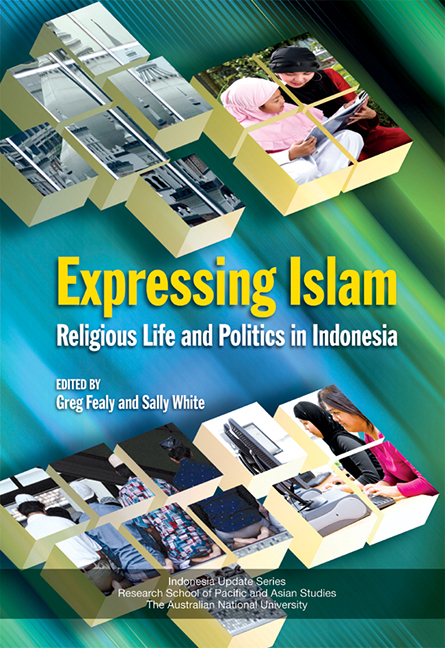Book contents
- Frontmatter
- Contents
- List of Figures and Tables
- List of Contributors
- Acknowledgments
- Glossary
- Map
- 1 Introduction
- PART I EXPRESSING PERSONAL PIETY
- 2 Consuming Islam: Commodified Religion and Aspirational Pietism in Contemporary Indonesia
- 3 Modulations of Active Piety: Professors and Televangelists as Promoters of Indonesian ‘Sufisme’
- 4 Throwing Money at the Holy Door: Commercial Aspects of Popular Pilgrimage in Java
- 5 ‘Spiritual Meal’ or Ongoing Project? The Dilemma of Dakwah Oratory
- 6 Marketing Morality: The Rise, Fall and Rebranding of Aa Gym
- PART II POLITICAL, SOCIAL AND LEGAL EXPRESSIONS OF ISLAM
- PART III THE ISLAMIC ECONOMY
- Index
- Indonesia Update Series
- Plate section
2 - Consuming Islam: Commodified Religion and Aspirational Pietism in Contemporary Indonesia
from PART I - EXPRESSING PERSONAL PIETY
Published online by Cambridge University Press: 21 October 2015
- Frontmatter
- Contents
- List of Figures and Tables
- List of Contributors
- Acknowledgments
- Glossary
- Map
- 1 Introduction
- PART I EXPRESSING PERSONAL PIETY
- 2 Consuming Islam: Commodified Religion and Aspirational Pietism in Contemporary Indonesia
- 3 Modulations of Active Piety: Professors and Televangelists as Promoters of Indonesian ‘Sufisme’
- 4 Throwing Money at the Holy Door: Commercial Aspects of Popular Pilgrimage in Java
- 5 ‘Spiritual Meal’ or Ongoing Project? The Dilemma of Dakwah Oratory
- 6 Marketing Morality: The Rise, Fall and Rebranding of Aa Gym
- PART II POLITICAL, SOCIAL AND LEGAL EXPRESSIONS OF ISLAM
- PART III THE ISLAMIC ECONOMY
- Index
- Indonesia Update Series
- Plate section
Summary
When you look around you, you see Islam everywhere. People greet each other all the time with ‘Peace be upon you’ (assalamu alaikum). Almost anywhere you go, you'll hear the call to prayer (azan) and see mosques crowded at prayer time. Go into McDonalds and they have halal certificates on the wall and women serving in headscarves. Bookstores are full of books on how to be a good Muslim. On TV, Islam is referred to all the time. … This has now become normal; people expect it to be this way. It wasn't like this when we were kids. Islam is now in the centre of everyday life.
The role of religion in the contemporary globalised world is changing rapidly. New technology and accelerated information flows combined with urbanisation and growing prosperity have led to new forms of religious expression, in Indonesia as elsewhere. Patterns of Islamic behaviour have changed dramatically in the past 40 years, and Islam has a much greater presence in social, cultural and political life than it had in the 1960s. The number of mosques and the size of their congregations have increased sharply, as have the popularity of Islamic dress and the use of Islamic symbols and language in the media and in public spaces. Islamic publishing, education and tourism are thriving, and Muslim entrepreneurs have found innovative ways of using new technology to popularise their religious messages. Indeed, Islam is penetrating far more deeply into people's lives than ever before and Muslims are expressing their faith in a multitude of ways that are seldom examined by scholars. Much of this religious expression is taking a commodified form, in which Muslims selectively consume ‘Islamic’ products from an expanding spiritual marketplace rather than following the settled patterns of behaviour of their parents and grandparents.
There is considerable debate among scholars and practitioners about the impact of these new commodified forms of Islam. Some find much to commend in ‘Islamic consumption’, arguing that it brings new religious meaning into the lives of the faithful and helps to create a society in which Islamic principles are more strictly upheld. Others bemoan what they see as the shallow commercialisation of Islam and emphasis on outward behaviour rather than building an intellectual and spiritual appreciation of the deeper significance and beauty of the faith.
- Type
- Chapter
- Information
- Expressing IslamReligious Life and Politics in Indonesia, pp. 15 - 39Publisher: ISEAS–Yusof Ishak InstitutePrint publication year: 2008

